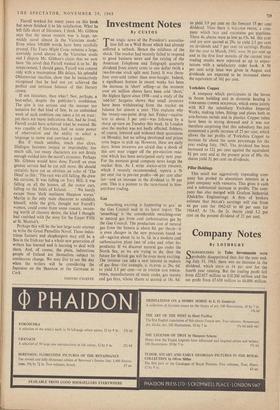Investment Notes
By CUSTOS
rTI HE tragic news of the President's assassina- tion fell on a Wall Street which had already suffered a setback. Hence the mildness of the shock. The market had recently failed to respond to good business news and the raising of the American Telephone and Telegraph quarterly dividend from ninety cents to one dollar (with a two-for-one stock split next June). It was there- fore over-sold rather than over-bought. Indeed, a significant feature in recent weeks has been. the increase in 'short' selling—at the moment over six million shares have been sold 'short,' the highest figure since 1958—and a study of the 'odd-lot' bargains shows that small investors have been withdrawing from the market on balance for almost a year. This explains why the twenty-one-point drop last Friday—equiva- lent to about 3 per cent—was followed by a sharp up-turn on Tuesday this week. In London also the market was not badly affected. Jobbers, of course, lowered and widened their quotations on Monday, but no selling developed and prices soon began to pick up. However, these are early days. Some investors are afraid that a shock of this sort may trigger off the pre-election reac- tion which has been anticipated early next year. For the moment good company news keeps the market firm. As I write ANGLO-AUTO FINANCE, which I recently recommended, reports a 56 per cent rise in pre-tax profits-66 per cent after tax—and an increase in the dividend to 50 per cent. This is a pointer to the turn-round in hire- purchase trading.
Gas 'Something exciting is happening to gas,' as the Gas Council said in its latest report. The 'something' is the considerable switching-over to natural gas from coal carbonisation gas by the Gas Council. The production cost of natural gas from the Sahara is about 8d. per therrn—it is even cheaper in the, new processes based on oil—against about Is. to Is. 3d. in a modern coal carbonisation plant (net of coke and other by- products). If we discover natural gas under the North Sea, as we are trying to do, then the future for British gas will be even more exciting. The investor can take a new interest in makers of gas fires—for example, S. FLAVEL at 26s. 6d. to yield 5.3 per cent—or in UNITED GAS INDUS- TRIES, manufacturers of main cocks, gas meters and gas fires, whose shares at quoted at 18s. 9d. to yield 3.9 per cent on the forecast 15 per cent dividend. Then there iS WILLIAM PRESS, a com- pany which lays and maintains gas pipelines. These 4s. shares were as low as 15s. 6d. this year and are now quoted at 29s. to yield 2.3 per cent on dividends and 7 per cent on earnings. Profits for the year to March, 1963. were 50 per cent up and in the first four months of the current year trading results were reported as up to expec- tations with a satisfactory order book. A 50 per cent scrip issue was given in August and dividends are expected to be increased above the equivalent of 163 per cent.
Yorkshire Copper A company which participates in the boom in house building and in domestic heating is YORKSHIRE COPPER HOLDINGS, which owns jointly with ICI the subsidiary Yorkshire Imperial Works, making tubes, fittings and plates both in, non-ferrous metals and in plastics. Copper tubes have been in strong demand and it was not therefore surprising that this subsidiary has just announced a profit increase of 25 per cent, which allows the net profits of Yorkshire Copper to increase by about the same percentage for the year ending July, 1963. The dividend has been increased to 121 per cent against the equivalent 83 per cent and at the present price of 80s. the shares yield 33 per cent on dividends.
Pillar Holdings This small but aggressively expanding com- pany has pooled its aluminium interests in a joint company with VENESTA. This gives it cash and a substantial increase in profits. The com- pany has also merged with Grafton Industrial (Quicktho Engineering). A firm of brokers estimate that Plumes earnings will rise from 44 per cent for 1962-63 to 60 per cent for 1964-65. At 13s. the 2s. shares yield 3.2 per cent on the present dividend of 21 per cent.






























































 Previous page
Previous page